Jeffrey Bowyer-Chapman never imagined he would play an openly gay character in the world of Disney, but here he is breaking barriers and continuously having the conversation about representation. Bowyer-Chapman is currently preparing for the premiere of Disney+’s reboot of the Doogie Howser series and of course, we wanted to get all the details surrounding that project, while also discussing his role and experience working on the Emmy-nominated Lifetime/Hulu series, Unreal.
Tell us how you felt when you first found out you would have the opportunity to play an openly gay character in a Disney property.
Ooh! Girl, there’s so many levels to that question. First off, the fact that I was having the opportunity to work on a Disney+ show in general, was a dream come true. It’s such a win for any actor to be invited into the Disney-verse. Secondly, to play an openly queer character was a dream come true on another level. It was everything I ever aspired to be as a child. I loved Disney growing up. My mother, sister, and I made our weekly ritual out of watching Disney movies of the week on Sunday nights. I didn’t have the same privilege as my white friends, where they could turn on the television and see reflections of themselves. They saw people that looked and sounded like them. It was really the catalyst that led me to be an actor in the first place. I knew that if it was ever going to exist for representation and for people that looked like me on television and film, it didn’t seem like anyone at that point in my life was able to chop up the bits to make it happen. I knew that it was something I was going to have to do and be apart of myself. When I was offered the role on Doogie Kamealoha, M.D, it was a very multifaceted dream come true.
How would you describe working on Doogie Kamealoha, M.D during an ongoing pandemic?
We filmed entirely during the pandemic. We started in January 2021 in Hawaii, and we just left in June. Safety protocols were on point. There were about 40,000 cases a day in Los Angeles when we first left. There were 100 cases a day in all of Hawaii when we got there. There’s a real sense of community and mutual respect for one another in reverence for elders and ancestors. The community and tribe is amazing in Hawaii, it’s something that does not exist here on the main lands. Everyone was looking out for one another on the island. We all wore masks and socially distanced while washing hands and getting vaccinated. There was no question or second guessing it. We protected ourselves, while protecting the ones we love. Because of that, it created a safe working environment for everyone to come together and create this ten-episode series in the midst of a global pandemic.
How was your experience working on the Lifetime/Hulu hit series, Unreal?
Unreal was another dream come true in my career for another set of reasons. It was such a fun experience on that show because of the nature of the show. There were five series regulars who would come back every season. The rest of the cast was filled with ten new actors every season that would come in and play the contestants or suitor. It always kept it fresh and alive. It was fun, there was always new energy on set. We learned from new individuals. I learned so much about the art of acting and about the industry. I learned to stand up and speak up for myself. There is power in saying “no,” and I really came into myself on that show. When I first booked the pilot for Unreal back in 2013, we actually filmed it in Atlanta in Buckhead. They decided to rewrite and recast a majority of the show. In doing so, Marti Noxon called me and told me she was going to rewrite my character. She liked who I was, Jeffrey the person she met behind the scenes. She liked me better than the character they had originally written in the script. That was an incredible gift. Marti Noxon is someone I had grown up loving and adoring. I was a huge fan as she was an executive producer on Buffy The Vampire Slayer, which was my favorite television show growing up. In my journey of becoming an actor, paying attention to who was at the helm of the ship was something that was always at the forefront of my mind. It was never really about who the cast was. It was about who wrote it, who’s producing it, and who is a part of it. When I was a kid growing up, I wasn’t necessarily drawn to the mainstream shows that all my other friends were watching. I was watching independent films and cult-classics like Buffy The Vampire Slayer. That was always about artistry and creativity. I knew that the actors were the ones bringing it to life on screen, but it starts with people that are behind closed doors. I may never know their faces, but I can see their names in the credits. I didn’t know how I was going to work with Marti Noxon someday, but I knew that I would. At 28-years-old, to have Marti Noxon call me at my house and say that she wanted to write a character for me is just mind blowing
How would you describe being a creative during this time of COVID-19?
It’s a completely different experience than just two years ago. So little of what we do as actors and time is spent acting at this point. For Doogie Kamealoha, M.D, creatives sent me the script to my home, I tapped two scenes on my iPhone and sent it in. That was it! They gave me the role. It’s usually a much more in-depth process. During the pandemic, it’s much more precious because everyone is mindful of people being in a closed spaces. For what would normally take seven hours to shoot a four-page scene in the past, now we only do two or three takes of each scene and then you’re moving on. It’s more fast-paced than what so many of us in the cast were used to. Equally, I think it’s satisfying because we got to exercise those acting muscles. We’re in acting bootcamp, where it’s like hit your mark, say your lines, you get to do it twice, and don’t mess it up! It was a fun challenge in many ways.
What are you currently working on and what can we expect to see from you in the future?
I am in the midst of recording a new podcast series called INCLUDR PODCAST, which is brought by the Andrew Nikou Foundation., which is a nonprofit here in Los Angeles. It’s about deep inclusion, brain science, and the way our brains work as human beings to include or exclude certain groups of individuals. At this point in 2021 at the heels of the Black Lives Matter movement, Me Too, and Times Up – we’re more aware now than ever of the deep inequality that has been existing in this world and industry for far too long. None of us are willing to go back to that in that capacity. So many of us are left with wanting to make change, but we don’t necessarily know how to make change. For one of my episodes, I sat down with a neuroscientist – who talks to us about the science behind bias and how and why our brain works at a certain capacity. We have to start practicing inclusive practices so that everyone can be invited to the table. I’m going to Canada for a movie this fall, so that will be fun and of course, we’re hoping for season two of Doogie Kamealoha, M.D on Disney+.
For more on Jeffrey Bowyer-Chapman, follow him on Facebook, Instagram, & Twitter.
Featured Image by Hudson Taylor


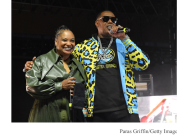
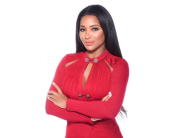
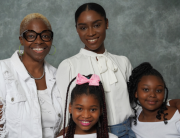
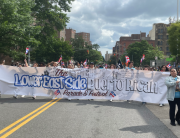
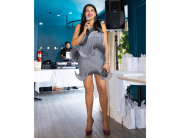
Add Comment
You must be logged in to post a comment.